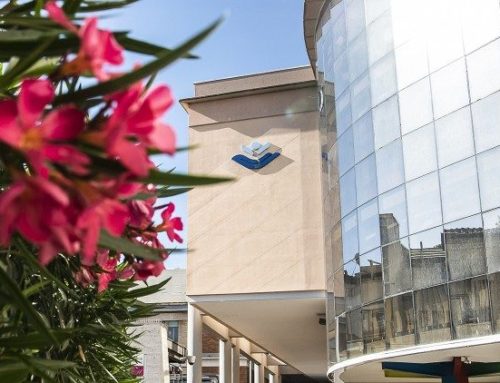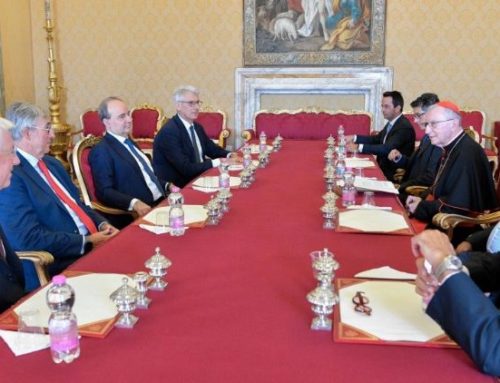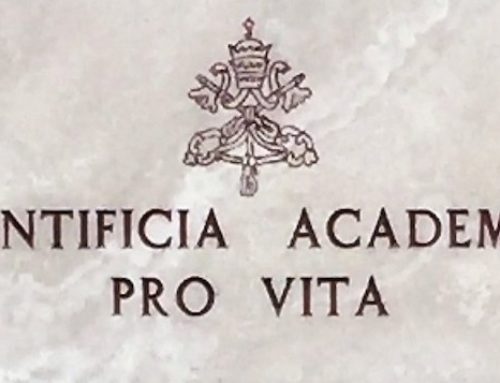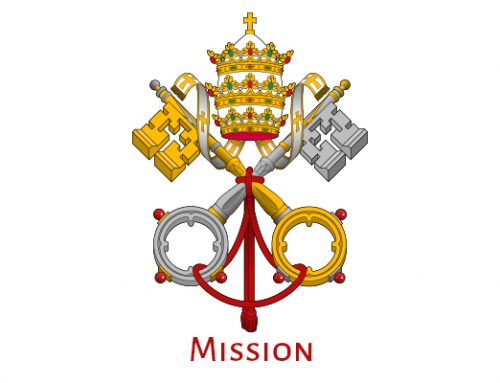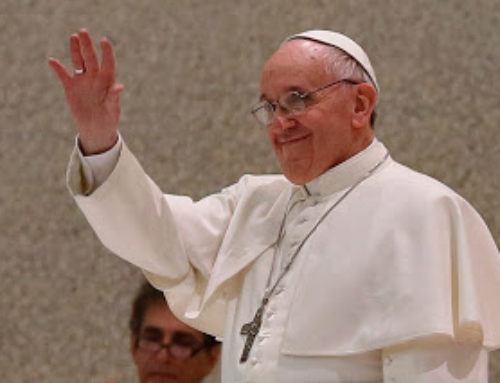30 December 1988
Apostolic Exhortation
Promoting the Dignity of the Person
37.To rediscover and make others rediscover the inviolable dignity of every human person makes up an essential task, in a certain sense, the central and unifying task of the service which the Church and the lay faithful in her are called to render to the human family.
Among all other earthly beings, only a man or a woman is a “person,” a conscious and free being and, precisely for this reason, the ‘center and summit’ of all that exists on the earth. (135)
The dignity of the person is the most precious possession of an individual. As a result, the value of one person transcends all the material world. The words of Jesus, “For what does it profit a man to gain the whole world and to forfeit his life?” (Mk 8:36) contain an enlightening and stirring statement about the individual: value comes not from what a person “has-even if the person possessed the whole world!-as much as from what a person ‘is”: the goods of the world do not count as much as the goods of the person, the good which is the person individually.
The dignity of the person is manifested in all its radiance when the person’s origin and destiny are considered: created by God in his image and likeness as well as redeemed by the most precious blood of Christ, the person is called to be a “child in the Son” and a living temple of the Spirit, destined for the eternal life of blessed communion with God. For this reason every violation of the personal dignity of the human being cries out in vengeance to God and is an offense against the Creator of the individual.
In virtue of a personal dignity, the human being is always a value as an individual, and as such demands being considered and treated as a person and never, on the contrary, considered and treated as an object to be used or as a means or as a thing.
The dignity of the person constitutes the foundation of the equality of all people among themselves. As a result, all forms of discrimination are totally unacceptable especially those forms which unfortunately continue to divide and degrade the human family: from those based on race or economics to those social and cultural, from political to geographic, etc. Each discrimination constitutes an absolutely intolerable injustice, not so much for the tensions and the conflicts that can be generated in the social sphere, as much as for the dishonor inflicted on the dignity of the person: not only to the dignity of the individual who is the victim of the injustice, but still more to the one who commits the injustice.
Just as personal dignity is the foundation of equality of all people among themselves, so it is also the foundation of participation and solidarity of all people among themselves: dialogue and communion are rooted ultimately in what people “are,” first and foremost, rather than on what people “have.”
The dignity of the person is the indestructible property of every human being. The force of this affirmation is based on the uniqueness and irrepeatability of every person. From it flows that the individual can never be reduced by all that seeks to crush and to annihilate the person into the anonymity that conies from collectivity, institutions, structures and systems. As an individual, a person is not a number or simply a link in a chain, nor even less, an impersonal element in some system. The most radical and elevating affirmation of the value of every human being was made by the Son of God in his becoming man in the womb of a woman, as we continue to be reminded each Christmas (136).
Respecting the inviolable Right to Life
38.In effect, the acknowledgment of the personal dignity of every human being demands the respect, the defense and the promotion of the rights of the human person. It is a question of inherent, universal and inviolable rights. No one, no individual, no group, no authority, no state, can change-let alone eliminate-them because such rights find their source in God himself.
The inviolability of the person which is a reflection of the absolute inviolability of God, finds its primary and fundamental expression in the inviolability of human life. Above all, the common outcry, which is justly made on behalf of human rights-for example, the right to health, to home, to work, to family, to culture-is false and illusory if the right to life, the most basic and fundamental right and the condition for all other personal rights, is not defended with maximum determination.
The Church has never yielded in the face of all the violations that the right to life of every human being has received, and continues to receive, both from individuals and from those in authority. The human being is entitled to such rights in every phase of development, from conception until natural death; and in every condition, whether healthy or sick, whole or handicapped, rich or poor. The Second Vatican Council openly proclaimed: All offenses against life itself, such as every kind of murder, genocide, abortion, euthanasia and willful suicide; all violations of the integrity of the human person, such as mutilation, physical and mental torture, undue psychological pressures; all offenses against human dignity, such as subhuman living conditions, arbitrary imprisonment, deportation, slavery, prostitution, the selling of women and children, degrading working conditions where men are treated as mere tools for profit rather than free and responsible persons; all these and the like are certainly criminal: they poison human society; and they do more harm to those who practice them than those who suffer from the injury. Moreover, they are a supreme dishonor to the Creator. (137)
If, indeed, everyone has the mission and responsibility of acknowledging the personal dignity of every human being and of defending the right to life, some lay faithful are given a particular title to this task: such as parents, teachers, health care workers and the many who hold economic and political power.
The Church today lives a fundamental aspect of her mission in lovingly and generously accepting every human being, especially those who are weak and sick. This is made all the more necessary as a “culture of death” threatens to take control. In fact, “the Church family believes that human life, even if weak and suffering, is always a wonderful gift of God’s goodness. Against the pessimism and selfishness which casts a shadow over the world, the Church stands for life: in each human life she sees the splendor of that ‘Yes,’ that ‘Amen,’ which is Christ himself (cf 2 Cor 1 :19; Rev 3:14). To the ‘No’ which assails and afflicts the world, she replies with this living ‘Yes,’ this defending of the human person and the world from all who plot against life.” (138) it is the responsibility of the lay faithful, who more directly through their vocation or their profession are involved in accepting life, to make the Church’s “Yes’ to human life concrete and efficacious.
The enormous development of biological and medical science, united to an amazing power in technology, today provides possibilities on the very frontier of human life which imply new responsibilities. In fact, today humanity is in the position not only of “observing” but even “exercising a control over” human life at its very beginning and in its first stages of development.
The moral conscience of humanity is not able to turn aside or remain indifferent in the face of these gigantic strides accomplished by a technology that is acquiring continually more extensive and profound dominion over the working processes that govern procreation and the first phases of human life. Today as perhaps never before in history or in this field, wisdom shows itself to be the only firm basis to salvation, in that persons engaged in scientific research and in its application are always to act with intelligence and love, that is, respecting, even remaining in veneration of the inviolable dignity of the personhood of every human being from the first moment of life’s existence.
This occurs when science and technology are committed with licit means to the defense of life and the cure of disease in its beginnings, refusing on the contrary-even for the dignity of research itself-to perform operations that result in falsifying the genetic patrimony of the individual and of human generative power. (139)
The lay faithful, having responsibility in various capacities and at different levels of science as well as in the medical, social, legislative and economic fields must courageously accept the “challenge” posed by new problems in bioethics. The Synod Fathers used these words; “Christians ought to exercise their responsibilities as masters of science and technology, and not become their slaves . . . In view of the moral challenges presented by enormous new technological power endangering not only fundamental human rights but the very biological essence of the human species, it is of utmost importance that lay Christians-with the help of the universal Church-take up the task of calling culture back to the principles of an authentic humanism, giving a dynamic and sure foundation to the promotion and defense of the rights of the human being in one’s very essence-an essence which the preaching of the Gospel reveals to all. (140)
Today maximum vigilance must be exercised by everyone in the face of the phenomenon of the concentration of power and technology. In fact, such a concentration has a tendency to manipulate not only the biological essence but the very content of people’s consciences and life-styles, thereby worsening the condition of entire peoples by discrimination and marginization.
Free to Call Upon the Name of the Lord
39. Respect for the dignity of the person, which implies the defense and promotion of human rights, demands the recognition of the religious dimension of the individual. This is not simply a requirement “concerning matters of faith,” but a requirement that finds itself inextricably bound up with the very reality of the individual. In fact, the individual’s relation to God is a constitutive element of the very “being” and “existence” of an individual: it is in God that we “live, move and have our being” (Acts 17:28). Even if not all believe this truth, the many who are convinced of it have the right to be respected for their faith and for their life-choice, individual and communal, that flows from that faith. This is the right of freedom of conscience and religious freedom, the effective acknowledgment of which is among the highest goods and the most serious duties of every people that truly wishes to assure the good of the person and society. “Religious freedom, an essential requirement of the dignity of every person, is a cornerstone of the structure of human rights, and for this reason an irreplaceable factor in the good of individuals and of the whole of society, as well as of the personal fulfillment of each individual. It follows that the freedom of individuals and of communities to profess and practice their religion is an essential element for peaceful human coexistence …. The civil and social right to religious freedom, inasmuch as it touches the most intimate sphere of the spirit, is a point of reference for the other fundamental rights and in some way becomes a measure of them.” (141)
The Synod did not forget the many brothers and sisters that still do not enjoy such a right and have to face difficulties, marginization, suffering, persecution, and oftentimes death because of professing the faith. For the most part, they are brothers and sisters of the Christian lay faithful. The proclamation of the Gospel and the Christian testimony given in a life of suffering and martyrdom make up the summit of the apostolic life among Christ’s disciples, just as the love for the Lord Jesus even to the giving of one’s life constitutes a source of extraordinary fruitfulness for the building up of the Church. Thus the mystic vine bears witness to its earnestness in the faith, as expressed by St. Augustine: “But that vine, as predicted by the prophets and even by the Lord himself, spread its fruitful branches in the world, and becomes the more fruitful the more it is watered by the blood of martyrs,” (142)
The whole Church is profoundly grateful for this example and this gift. These sons and daughters give reason for renewing the pursuit of a holy and apostolic life. In this sense the Fathers at the Synod have made it their special duty “to give thanks to those lay people who, despite their restricted liberty, live as tireless witnesses of faith in faithful union with the Apostolic See, although they may be deprived of sacred ministers. They risk everything, even life. In this way the lay faithful bear witness to an essential property of the Church: God’s Church is born of God’s grace which is expressed in an excellent way in martyrdom.” (143)
Without doubt, all that has been said until now on the subject of respect for personal dignity and the acknowledgment of human rights concerns the responsibility of each Christian, of each person. However, we must immediately recognize how such a problem today has a world dimension: in fact, it is a question which at this moment affects entire groups, indeed entire peoples, who are violently being denied their basic rights. Those forms of unequal development among the so-called different ‘Worlds” were openly denounced in the recent Encyclical Sollicitudo Rei Socialis.
Respect for the human person goes beyond the demands of individual morality. Instead, it is a basic criterion, an essential element in the very structure of society, since the purpose of the whole of society itself is geared to the human person.
Thus, intimately connected with the responsibility of service to the person is the responsibility to serve society, as the general task of that Christian animation of the temporal order to which the lay faithful are called as their proper and specific role.
Charity: The Soul and Sustenance of Solidarity
41. Service to society is expressed and realized in the most diverse ways, from those spontaneous and informal to those more structured; from help given to individuals to those destined for various groups and communities of persons.
The whole Church as such is directly called to the service of charity: “In the very early days the Church added the agape to the Eucharistic Supper, and thus showed herself to be wholly united around Christ by the bond of charity. So too, in all ages, she is recognized by this sign of love, and while she rejoices in the undertakings of others, she claims works of charity as her own inalienable duty and right. For this reason, mercy to the poor and the sick, works of charity and mutual aid intended to relieve human needs of every kind, are held in special honor in the Church. (148)
Charity towards one’s neighbor, through contemporary forms of the traditional spiritual and corporal works of mercy, represent the most immediate, ordinary and habitual ways that lead to the Christian animation of the temporal order, the specific duty of the lay faithful.
Through charity towards one’s neighbor, the lay faithful exercise and manifest their participation in the kingship of Christ, that is, in the power of the Son of man who “came not to be served but to serve” (Mk 10:45). They live and manifest such a kingship in a most simple yet exalted manner, possible for everyone at all times because charity is the highest gift offered by the Spirit for building up the Church (cf 1 Cor 13:13) and for the good of humanity. In fact, charity gives life and sustains the works of solidarity that look to the total needs of the human being.
The same charity, realized not only by individuals but also in a joint way by groups and communities, is and will always be necessary. Nothing and no one will be able to substitute for it, not even the multiplicity of institutions and public initiatives forced to give a response to the needs-oftentimes today so serious and widespread-of entire populations. Paradoxically such charity is made increasingly necessary the more that institutions become complex in their organization and pretend to manage every area at hand. In the end such projects lose their effectiveness as a result of an impersonal functionalism, an overgrown bureaucracy, unjust private interests and an all-too-easy and generalized disengagement from a sense of duty.
Precisely in this context various forms of volunteer work which express themselves in a multiplicity of services and activities continue to come about and to spread, particularly in organized society, If this impartial service be truly given for the good of all persons, especially the most in need and forgotten by the social services of society itself, then volunteer work can be considered an important expression of the apostolate in which lay men and women have a primary role.
Older People and the Gift of Wisdom
48. I now address older people, oftentimes unjustly considered as unproductive if not directly an insupportable burden, I remind older people that the Church calls and expects them to continue to exercise their mission in the apostolic and missionary life. This is not only a possibility for them, but it is their duty even in this time in their life when age itself provides opportunities in some specific and basic way.
The Bible delights in presenting the older person as the symbol of someone rich in wisdom and fear of the Lord (cf. Sir 25:4-6). In this sense the “gift’ of older people can he specifically that of being the witness to tradition in the faith, both in the Church and in society (cf. Ps 44:2; Ex 12:26-27), the teacher of the lessons of life (cf. Sir 6:34; 8:11-12 ), and the worker of charity.
At this moment the growing number of older people in different countries worldwide and the expected retirement of persons from various professions and the workplace provides older people with a new opportunity in the apostolate. Involved in the task is their determination to overcome the temptation of taking refuge in a nostalgia-in a never-to-return past-or fleeing from present responsibility because of difficulties encountered in a world of one novelty after another, They must always have a clear knowledge that one’s role in the Church and society does not stop at a certain age at all, but at such times knows only new ways of application. As the Psalmist says: “They still bring forth fruit in old age, they are ever full of sap and green, to show that the Lord is upright” (Ps 92:15-16). 1 repeat all that I said during the celebration of the Older People’s Jubilee: “Arriving at an older age is to be considered a privilege: not simply because not everyone has the good fortune to reach this stage in life, but also, and above all, because this period provides real possibilities for better evaluating the past, for knowing and living more deeply the Paschal Mystery, for becoming an example in the Church for the whole People of God – . . . Despite the complex nature of the problems you face: a strength that progressively diminishes, the insufficiencies of social organizations, official legislation that comes late, or the lack of understanding by a self-centered society, you are not to feel yourselves as persons underestimated in the life of the Church or as passive objects in a fast-paced world, but as participants at a time of life which is humanly and spiritually fruitful. You still have a mission to fulfill, a contribution to make. According to the divine plan, each individual human being lives a life of continual growth, from the beginning of existence to the moment at which the last breath is taken.” (175)
The Sick and the Suffering
53.People are called to joy. Nevertheless, each day they experience many forms of suffering and pain. The Synod Fathers in addressing men and women affected by these various forms of suffering and pain used the following words in their final Message: ‘You who are the abandoned and pushed to the edges of our consumer society; you who are sick, people with disabilities, the poor and hungry, migrants and prisoners, refugees, unemployed, abandoned children and old people who feel alone; you who are victims of war and all kinds of violence-the Church reminds you that she shares your suffering. She takes it to the Lord who in turn associates you with his redeeming Passion. You are brought to life in the light of his resurrection. We need you to teach the whole world what love is. We will do everything we can so that you may find your rightful place in the Church and in society.” (198)
In the context of such a limitless world as human suffering, we now turn our attention to all those struck down by sickness in its various forms: sickness is indeed the most frequent and common expression of human suffering.
The Lord addresses his call to each and every one. Even the sick are sent forth as laborers into the fords vineyard: the weight that wearies the body’s members and dissipates the soul’s serenity is far from dispensing a person from working in the vineyard. Instead the sick are called to live their human and Christian vocation and to participate in the growth of the Kingdom of God in a new and even more valuable manner. The words of the Apostle Paul ought to become their approach to life, or better yet cast an illumination to permit them to see the meaning of grace in their very situation: “In my flesh I complete what is lacking in Christ’s afflictions for the sake of his body, that is, the Church” (Col 1:24). Precisely in arriving at this realization, the Apostle is raised up in joy: “I rejoice in my sufferings for your sake” (Col 1:24). In the same way many of the sick can become bearers of the “joy inspired by the Holy Spirit in much affliction” (1 Thes 1:6) and witnesses to Jesus’ resurrection. A handicapped person expressed these sentiments in a presentation in the Synod Hall: “It is very important to make clear that Christians who live in situations of illness, pain and old age are called by God not only to unite their suffering to Christ’s Passion but also to receive in themselves now, and to transmit to others, the power of renewal and the joy of the risen Christ (cf 2 Cor 4:10-11; 1 Pt 4:13; Rom 8:18 ff).” (199)
On the Church’s part-as it reads in the Apostolic Letter Salvifici Doloris-”Born in the mystery of Redemption in the Cross of Christ, the Church has to try to meet man in a special way on the path of suffering. In this meeting, man ‘becomes the way for the Church,’ and this is one of the most important ways.” (200) At this moment the suffering individual is the way of the Church because that person is, first of all, the way of Christ himself who is the Good Samaritan who “does not pass by,” but “has compassion on him, went to Him . . . bound up his wounds. . . took care of him” (Lk 10:32-34).
From century to century the Christian community in revealing and communicating its healing love and the consolation of Jesus Christ, has reenacted the gospel parable of the Good Samaritan in caring for the vast multitude of persons who are sick and suffering. This came about through the untiring commitment of all those who have taken care of the sick and suffering as a result of science and the medical arts, as well as the skilled and generous service of health care workers. Today there is an increase in the presence of lay women and men in Catholic hospital and health care institutions. At times the lay faithful’s presence in these institutions is total and exclusive. It is to just such people-doctors, nurses, other health care workers, volunteer-that the call becomes the living sign of Jesus Christ and his Church in showing love towards the sick and suffering.
Renewed Pastoral Action
54.It is necessary that this most precious heritage which the Church has received from Jesus Christ, ‘Physician of the body and the spirit,” (201) must never diminish but must always come to be more valued and enriched through renewal and decisive initiatives of pastoral activity for and with the sick and suffering. This activity must be capable of sustaining and fostering attention, nearness, presence, listening, dialogue, sharing and real help towards individuals in moments when sickness and suffering sorely test not only faith in life but also faith in God and his love as Father.
One of the basic objectives of this renewed and intensified pastoral action, which must involve all components of the ecclesial community in a coordinated way, is an attitude which looks upon the sick person, the bearer of a handicap, or the suffering individual, not simply as an object of the Church’s love and service, but as an active and responsible participant in the work of evangelization and salvation. From this perspective the Church has to let the good news resound within a society and culture which, having lost the sense of human suffering, “censors” all talk on such a hard reality of life. The good news is the proclamation that suffering can even have a positive meaning for the individual and for society itself, since each person is called to a form of participation in the salvific suffering of Christ and in the joy of resurrection, as well as, thereby, to become a force for the sanctification and building up of the Church.
The proclamation of this good news gains credibility when it is not simply voiced in words, but passes into a testimony of life, both in the case of all those who lovingly care for the sick, the handicapped and the suffering, as well as the suffering themselves who are increasingly made more conscious and responsible of their place and task within and on behalf of the Church.
In order that “the civilization of love” can flourish and produce fruit in this vast world of human pain, I invite all to reread and meditate on the Apostolic Letter Salvifici Doloris from which
I am pleased to again propose the lines from its conclusion: “There should come together in spirit beneath the Cross of Calvary all suffering people who believe in Christ, and particularly those who suffer because of their faith in him who is the Crucified and Risen One, so that the offering of their sufferings may hasten the fulfillment of the prayer of the Savior himself, that all may be one. Let there also gather beneath the Cross all people of good will, for on this Cross is the ‘Redeemer of Man,’ the Man of Sorrows, who has taken upon himself the physical and moral sufferings of the people of all times, so that in love they may find the salvific meaning of their sorrow and valid answers to all their questions.
“Together with Mary, Mother of Christ who stood beneath the Cross, we pause beside all the crosses of contemporary man and we ask all of you who suffer to support us. We ask precisely you who are weak to become a source of strength for the Church and humanity. In the terrible battle between the forces of good and evil revealed to our eyes by our modern world, may your sufferings in union with the Cross of Christ be victorious.” (202)
John Paul II

